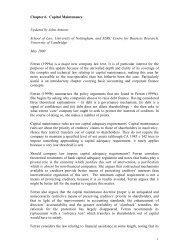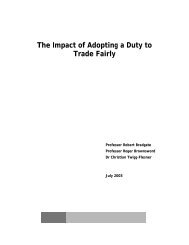From Exuberant Youth to Sustainable Maturity - DTI Home
From Exuberant Youth to Sustainable Maturity - DTI Home
From Exuberant Youth to Sustainable Maturity - DTI Home
Create successful ePaper yourself
Turn your PDF publications into a flip-book with our unique Google optimized e-Paper software.
5.1 Conclusions<br />
The UK games industry as a whole is a significant<br />
global player and a major export earner for the UK.<br />
The development sec<strong>to</strong>r in particular is highly<br />
thought of, creatively and technically, and very<br />
successful in terms of global sales compared <strong>to</strong> the<br />
size of the sec<strong>to</strong>r.<br />
However, the industry continues <strong>to</strong> suffer from a lack<br />
of recognition, given its size and value, and<br />
understanding, especially within the financial sec<strong>to</strong>r<br />
and government bodies. This is especially crucial as<br />
rising games project sizes and costs mean that UK<br />
developers and publishers need <strong>to</strong> consolidate or<br />
scale up <strong>to</strong> cope but face major obstacles <strong>to</strong> raising<br />
the funds needed <strong>to</strong> do so.<br />
In the UK, the lack of players with global scale, the<br />
comparative immaturity of the industry, its highly<br />
fragmented nature and the poorly developed<br />
industry-level infrastructure will all restrict the<br />
industry's ability <strong>to</strong> maintain and improve its<br />
competitiveness in the face of global competition.<br />
The UK is at a turning point in its development and<br />
there are no global parallels within the games sec<strong>to</strong>r<br />
for it <strong>to</strong> follow. No other country has so globally<br />
strong a development sec<strong>to</strong>r with a comparatively<br />
weaker native publishing sec<strong>to</strong>r. Developing an<br />
industry model that allows UK developers <strong>to</strong> build a<br />
solid and sustainable base for serving all global<br />
publishers, whilst also playing a larger role in the<br />
ownership and exploitation of intellectual property,<br />
offers the most promising route for securing the<br />
future competitiveness of the UK industry.<br />
In particular, success in attracting funding <strong>to</strong> enable<br />
the retention or ownership of intellectual property and<br />
the effective exploitation of that IP <strong>to</strong> fund future<br />
growth, consolidation or development will be critical.<br />
Without access <strong>to</strong> funds that can support this first<br />
step <strong>to</strong> growth, UK development companies and the<br />
UK's games industry as a whole, risks becoming<br />
simply a creative and technical "bodyshop" for<br />
overseas publishers and developers. In this scenario<br />
the imminent "golden age" in the games sec<strong>to</strong>r would<br />
not be reflected in a healthy outlook for the UK's<br />
industry. Instead there would be a continued hand<strong>to</strong>-mouth<br />
existence and increased financial frailty<br />
within the domestic sec<strong>to</strong>r, whilst the majority of the<br />
fruits of the UK's labour were retained overseas.<br />
CONCLUSIONS AND PROPOSED ACTION PLAN<br />
The UK industry and Government must make<br />
balanced progress on two fronts - continuing <strong>to</strong><br />
attract inward investment in the UK's games sec<strong>to</strong>r<br />
and "pump-priming" an as yet under-developed<br />
domestic games investment industry.<br />
The UK must continue <strong>to</strong> attract the levels of inward<br />
investment that it is receiving from overseas<br />
publishers. This will involve promoting the<br />
attractiveness of the UK (size and talent of the<br />
domestic development community, proximity <strong>to</strong><br />
Europe, English language etc.) and ensuring that the<br />
UK remains competitive for these firms in terms of<br />
conducting business from the UK.<br />
At the same time, the Government and industry<br />
should seek <strong>to</strong> attract, promote and ensure the<br />
success of the games industry specific funding<br />
schemes within the UK. There are a number of<br />
models now emerging in the UK and overseas -<br />
Fund4Games (UK), Interactive Finance<br />
(Belgium/France) and Capital Entertainment Group<br />
(US) all offer models of what is required <strong>to</strong> nurture<br />
the sec<strong>to</strong>r at this crucial stage in its development.<br />
Whilst the development of completion bonding<br />
approach <strong>to</strong> project funding provides a more widely<br />
applicable model for the industry. Without these<br />
project level funding mechanisms and the<br />
environment <strong>to</strong> see them first arise and then<br />
succeed, the domestic games industry will not<br />
prosper <strong>to</strong> the fullest of its potential.<br />
With no strong domestic publishing base (a situation<br />
that would worsen should Eidos be acquired) the UK<br />
development industry must ensure that it is well<br />
connected and maintains good exposure <strong>to</strong> overseas<br />
publishers. Despite the fact that many publishers<br />
have their European headquarters in the UK, this will<br />
involve establishing and maintaining contact with<br />
these companies in their home terri<strong>to</strong>ries. For US<br />
and Japanese publishers (the key parties) whilst this<br />
will certainly involve attendance at key industry<br />
conferences, such as E3, but contact beyond these<br />
hectic occasions will be essential - a cost of sales<br />
that again is likely <strong>to</strong> favour developers of scale.<br />
In terms of global markets, the UK should seek <strong>to</strong><br />
understand better the nature of and reasons for its<br />
current success. In Europe, in particular, where the<br />
UK share compares well with that of US and<br />
Japanese developers, the industry must explore the<br />
underlying drivers more closely. How much is due <strong>to</strong><br />
cultural compatibility between the UK and Europe?<br />
Competitiveness analysis of the UK games software sec<strong>to</strong>r Main report 47
















